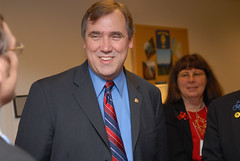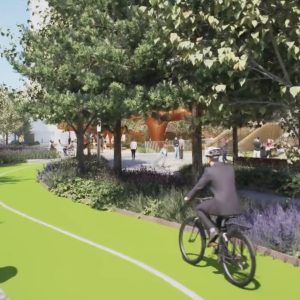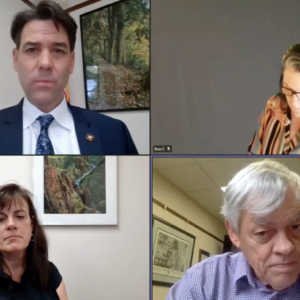Today on Capitol Hill, Senator Jeff Merkley (D-OR) had some good news for Oregon advocates — he plans to introduce a bill in the Senate that will act as a companion to House Rep. Earl Blumenauer’s Active Community Transportation Act. The ACT Act (H.R. 4722) would create a competitive grant program to fund active transportation projects to the tune of $400 million a year for five years.
Merkley’s bill should give the potential legislation a much-needed boost in the Senate — but the bill still has a long path to roll down before becoming law. While the $2 billion program would be just 0.4% of the total estimated cost of the next transportation bill, that bill is running on empty budget-wise. In addition, the bill also suffers from a bit of a perception problem.
Some members of Congress think the ACT Act is an expansion of the Non-motorized Transportation Pilot Program (NMTPP), a federally funded program that doled out $25 million to four hand-picked cities as part of the transportation bill passed in 2005. With the current political and budget climate on the Hill, there’s a lot of resistance to expansion of pilot programs and anything that even closely resembles earmarks.
Blumenauer’s legislative aide Tyler Frisbee is aware of this perception problem. In a session on Wednesday, she stated emphatically that the ACT Act is not an expansion of the NMTPP. “I’ve been having this conversation countless times… This bill is not at all related to the NMTPP!”
The reason for this confusion might be due to a campaign spearheaded by the national non-profit Rails to Trails Conservancy. RTC spent three years on their Campaign for Active Transportation which was billed as an effort to get $2 billion in federal funding for 40 communities. The RTC says the ACT Act is a direct manifestation of that effort. When RTC launched the campaign in March 2007, it was framed as an expansion of the NMTPP.
Back then, RTC’s Vice President of Policy Kevin Mills told me, “If it worked so great for four communities, why not forty?” On their own website, the RTC says their campaign aimed to “build on the success of” the NMTPP. The RTC spoke early and often with Portland (and other cities) and it seemed as though they were priming the pump for a select group of cities to receive the funding.
But earlier this week, when I asked Mills for clarification, he said “We never claimed that specific cities would necessarily be selected by Congress… We have been agnostic about who should select the communities.”
Despite the ACT Act’s lack of a funded transportation bill to attach itself to and a bit of confusion over its origins and intent, Merkley’s Senate version will help raise awareness of the legislation and the issues it tackles. It’s unlikely either bill would be passed separately, although Blumenauer says he’d love to “break this loose,” if the transportation bill re-authorization remains at a stalemate. More likely is that, with enough support, the langauge of the ACT Act could be folded into the next transportation bill (which is being worked on right now).
Merkley’s legislative aide Jeremiah Baumann says they hope to introduce their bill “soon.” “But,” he adds, “unless it looks like the Senate is getting ready to really move quickly on a transportation authorization (which isn’t looking likely), we’ll wait until we get a Republican co-sponsor.”
As icing on the cake, Merkley also decided to join the Congressional Bike Caucus.
Bike Summit coverage sponsored by Planet Bike. More stories on our special coverage page.







Thanks for reading.
BikePortland has served this community with independent community journalism since 2005. We rely on subscriptions from readers like you to survive. Your financial support is vital in keeping this valuable resource alive and well.
Please subscribe today to strengthen and expand our work.
Thank you, Senator!